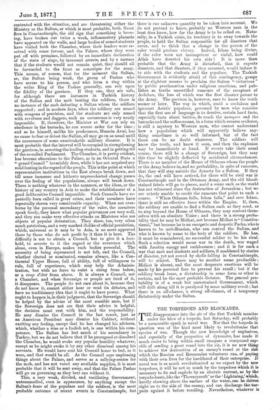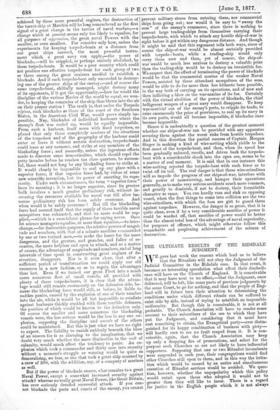THE TORPEDOES AND BLOCKADES.
THE disappearance into the air of the first Turkish monitor under the blow of a torpedo, last Saturday, will probably be a memorable epoch in naval war. Not that the torpedo in question was of the kind most likely to revolutionise that species of war. Though the new knowledge of explosives, and especially of the properties of dynamite, has made it much easier to bring within small compass a compound cap- able of sending a great vessel into the air, it is no new thisig to achieve the destruction of an enemy's vessel at the risk which the Russian and Roumanian volunteers rail, of paying with their own lives for the hardihood of their enterprise. If naval war is as much revolutionised as we expect by the new torpedoes, it will be not so much by the torpedoes which it is necessary to fix and explode by an electric current, as by the torpedo-boats, like the Thorneycroft ' or the Lightning,' which, hardly showing above the surface of the water, can -be driven right on to the side of the enemy, and can discharge the 'tor- pedo against it before recoiling. Nevertheless, whatever is
achieved by these more powerful engines, the destruction of the turret-ship at Matchin will be long remembered as the first signal of a great change in the tactics of naval warfare,—a
change which at present seems only too likely to equalise, for all purposes of aggression, the great naval Powers with the
smaller, or even smallest. For consider only how, unless the experiments for keeping torpedo-boats at a distance from our great ships succeed, the most powerful instru- ment which a great navy can apply,—the power of blockade,—will be crippled, or perhaps entirely abolished, by these torpedo-boats. It would be a poor country which could not produce one effective torpedo-boat for each group of two or three among the great cruisers needful to establish a blockade. And if each torpedo-boat only succeeded in destroy- ing one of the greater ships of the enemy,—and of course the same torpedo-boat, skilfully managed, might destroy many of its opponents, if it got the opportunity,—how far would the discipline of the various Navies of the world be equal, we won- der, to keeping the comrades of the ship thus blown into the air on their proper station ? The truth is, that under the Torpedo
regime, such blockades as those of the coast of the Southern States, in the American Civil War, would prove simply im- possible. Nay, blockades of individual harbours where the enemy's fleet was sealed up, would be equally impossible. From such a harbour, itself sown with fixed torpedoes, so placed that only those completely masters of the situations of the torpedoes and of the geography of the harbour could enter or leave it without certain destruction, torpedo-boats could issue at any moment, and strike at any members of the blockading force ; and assuredly, unless the ingenious efforts made to discover some iron-crinoline, which should repel the petty invader before he reaches too close quarters, be success- ful, there would not long be any blockading force to strike at. It would clearly be impossible to seal up any place with a superior force, if that superior force had, by virtue of some new scientific invention, lost its power of asserting its supe- riority. Under such circumstances, the term " superior force " loses its meaning ; it is no longer superior, since its greater bulk involves a much greater preliminary risk, without in- creasing the resources available for naval war till after im- mense preliminary risk has been safely overcome. And when would it be safely overcome ? Not till the blockading force had assured itself that the supply of these terrible naval mosquitoes was exhausted, and that no more could be sup- plied,—which is a roundabout phrase for saying never. Once let science manage to equalise, or more than equalise,—to inter- change,—for destructive purposes, the relative powers of magni- tude and numbers, with that of a minute machine commanded by one or two trained men,—to make the lesser foe the more dangerous, and the greater, and grander, and fuller of re- sources, the more helpless and open to attack, and as a matter of course, the advantage of magnitude and numbers, and of long intervals of time spent in constructing great engines of de- struction, disappears. Nor is it even clear, that after a sufficient period of transformation we could apply our old resources in a new fashion, so as to regain the advantages thus lost. Even if we turned our great Fleet into a much more numerous fleet of small vessels, all provided with plenty of these torpedo-boats, it is clear that the advan- tage would still remain enormously on the defensive side, be- cause the blockading force would still, as before, be liable to sudden panics, caused by the explosion of one of their number into the air, while it would be all but impossible to retaliate against harbours thickly studded with these terrible defences, the position of which would be known to the defenders only. Of course the smaller and more numerous the blockading vessels were, the less serious would be the loss in any one ex- plosion, supposing the discipline and morale of the others -could be maintained. But this is just what we have no right to expect. The liability to vanish suddenly beneath the blow of an unseen foe is so alarming to the imagination, that we doubt very much whether the mere diminution in the unit of calamity, would much affect the tendency to panic. An ex- plosion which took a commander and thirty men into eternity without a moment's struggle or warning would be quite as demoralising, we fear, as one that took a great ship manned by a crew of 300, with the addition, say, of a company of marines as well.
But if the power of blockade ceases, what remains to a great Naval Power, except a somewhat increased security against attack? whereas no really great Naval Power, like Great Britain, has ever seriously dreaded successful attack. If you can- not blockade the ports and coasts of the enemy, you cannot
prevent military stores from entering them, nor commercial ships from going out ; nor would it be easy to " sweep the seas" of the enemy's commerce, since there is -nothing to prevent large trading-ships from themselves carrying their torpedo-boats, with which to attack any hostile ship-of-war in sight before it got within any dangerous distance. And though it might be said that this argument tells both ways, since of course the ship-of-war would be almost certainly provided with torpedo - boats, while a trading-ship would only carry them now and then, yet of course, the ship-of- war would be much less anxious to destroy a valuable prize than the trading-ship would be to destroy an irresistible foe. We suspect that the effect of terminating the power of blockade would be that the commercial marine of the weaker Naval Powers, assisted by these attendant mosquitoes of the seas, would be able to do far more than has hitherto been possible, in the way both of carrying on its operations, and of now and then inflicting a blow on the war-marine of its foe. Certainly with the virtual abolition of the power of blockade, the chief belligerent weapon of a great navy would disappear. To keep war-materiel out of the enemy's ports, to cripple its trade, to raise enormously the price of provisions, to seal up its navy in its own ports, would all become impossible, if blockades once became impossible.
Hence it is undoubtedly a question of the greatest moment whether our ships-of-war can be provided with any apparatus securing them against the worst risks from hostile torpedoes. And in this direction the partial success of Captain Morgan Singer in making a kind of wire-netting which yields to the first onset of the torpedo-boat, and then, when its speed has been gradually reduced, recoils, and drives back the torpedo- boat with a considerable shock into the open sea, seems to be a matter of real moment. It is said that in one instance this wire-netting rejected the torpedo-boat with such force as to twist off its tail. The real danger is that these wire-crinolines will so impede the progress' of our ships-of-war, interfere with their power of manoeuvring, and hamper their operations generally, as to make very serious accidents much more common, and greatly to diminish, if not to destroy, their formidable character as rams. You can hardly ram and sink an opposing vessel, when the first things to come into collision are the two wire-crinolines, with which the foes are girt to guard them against torpedoes. However, the danger is so great, that it is quite clear, even if by a very considerable sacrifice of power it could be warded off, that sacrifice of power would be better than the almost total loss of the advantage of naval superiority, for purposes of offence, which might otherwise follow this remarkable and perplexing achievement of the science of destruction.



































 Previous page
Previous page